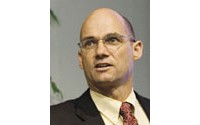Advertisement
Grab your lab coat. Let's get started
Welcome!
Welcome!
Create an account below to get 6 C&EN articles per month, receive newsletters and more - all free.
It seems this is your first time logging in online. Please enter the following information to continue.
As an ACS member you automatically get access to this site. All we need is few more details to create your reading experience.
Not you? Sign in with a different account.
Not you? Sign in with a different account.
ERROR 1
ERROR 1
ERROR 2
ERROR 2
ERROR 2
ERROR 2
ERROR 2
Password and Confirm password must match.
If you have an ACS member number, please enter it here so we can link this account to your membership. (optional)
ERROR 2
ACS values your privacy. By submitting your information, you are gaining access to C&EN and subscribing to our weekly newsletter. We use the information you provide to make your reading experience better, and we will never sell your data to third party members.
Environment
New Leader For Lawrence Livermore
Nuclear Weapons: Penrose (Parney) Albright will direct DOE national lab
by Jeff Johnson
October 27, 2011
Penrose (Parney) C. Albright today was named to direct the Department of Energy’s Lawrence Livermore National Laboratory (LLNL) in California. Albright, 58, is a physicist with more than 20 years of experience in the federal government and the private sector working on national science, research, and security issues.
Albright has held positions in the Defense and Homeland Security Departments, the White House Office of Science & Technology, the Defense Advanced Research Projects Agency, the Institute for Defense Analyses, and Civitas Group, a security consulting firm. He has been the associate director of global security at the lab since 2009.
In a briefing to announce his appointment, Albright stressed the importance of LLNL in maintaining the U.S.’s nuclear weapons capabilities. One of three key national nuclear weapons labs, LLNL’s core mission, he said, is to ensure that the nation’s nuclear stockpile remains safe and secure.
However, LLNL, like the other weapons labs, has been slowly moving into nonweapons science, and this shift will continue under his leadership, Albright said.
“I believe that the laboratory mission and duty is to deploy its scientific capabilities into the larger national security space,” he said. For instance, he pointed to the lab’s use of its high-performance computers—that were initially bought to inform scientific stockpile stewardship decisions—saying they could “develop the next generation of drugs for a variety of pathogens both relative to bioterrorism and public health.”
Climate change, energy, cancer treatment, and cyber security were among areas he identified that could profit from the lab’s large cadre of researchers and capabilities in science and engineering.
Albright also stressed that maintaining the lab as an “open campus” is for him an “absolute priority.”
“If we believe, as we do, that it is our mission to deploy our capability to the broader good of the nation for national security and economic health, then Livermore must be an open campus,” he said. The lab, he continued, will allow access by industry, academics, and foreign nationals and will work to create “seamless collaborations” with universities and industrial firms, “all working together to get these capabilities put into the service of the nation.”
Albright begins his term on Dec. 1 and was selected from among 200 applicants in a process that began last June, according to lab officials. He will be the lab’s 11th director since it was created in 1956. Albright takes over from George Miller, who is stepping down after six years at the lab’s helm.




Join the conversation
Contact the reporter
Submit a Letter to the Editor for publication
Engage with us on Twitter